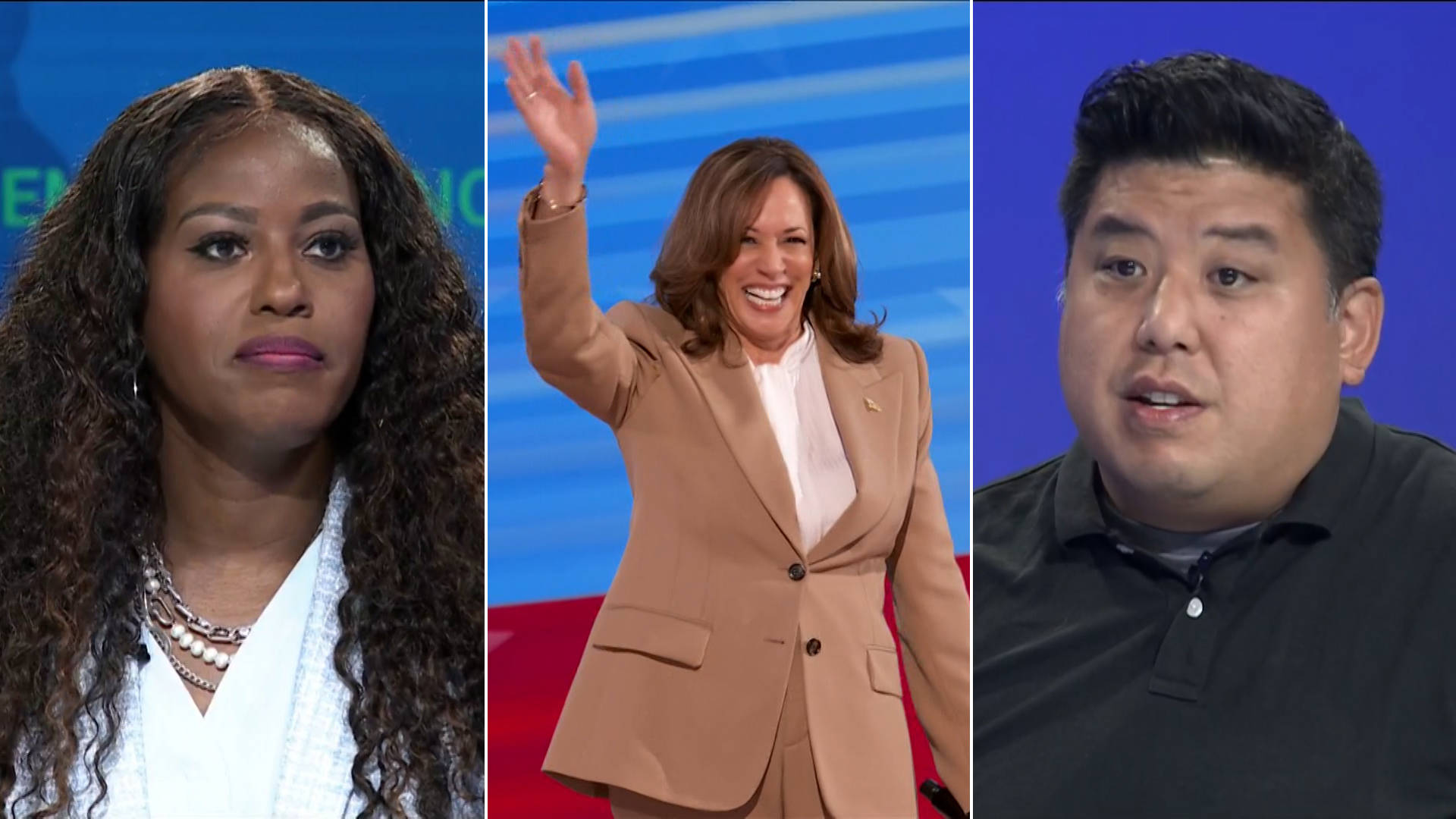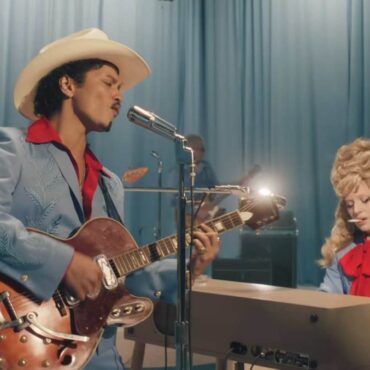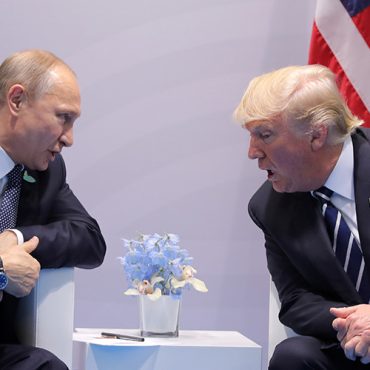This is a rush transcript. Copy may not be in its final form.
AMY GOODMAN: For more, we’re joined by two guests with a long history of labor organizing in Chicago and beyond. Stacy Davis Gates is president of the powerful Chicago Teachers Union, the former union of Chicago Mayor Brandon Johnson. And Alex Han is with us, executive director of In These Times, a Chicago publication that’s covered movements for change for decades. Alex was the vice president of SEIU Healthcare Illinois and Indiana for over a decade and was Midwest political director for Bernie Sanders in 2020. Both Alex and Stacy helped found United Working Families, which has elected dozens of working-class leaders.
We welcome you both to Democracy Now! Alex, let’s begin with you. Just for a little placement here in Chicago, talk about the history of this labor town.
ALEX HAN: Yeah, I mean, thank you for having me, Amy.
It’s about — I think about 15 blocks away from here is Haymarket Square, where in 1886, you know, immigrant workers gathered to demand an eight-hour day, were attacked viciously by police. And several labor organizers were martyred and buried a few miles west of here.
Chicago is the city in this country with the most local ones. CTU is the Local 1 of the American Federation of Teachers; SEIU Local 1, representing building service workers; Carpenters Local 1; UNITE HERE Local 1. The list goes on.
Chicago has a rich history not just of those origins, but of labor struggle and battle. And I do think, you know, the revitalization over the last 10 or 15 years that we’ve seen in the American labor movement obviously is not entirely coming out of the city of Chicago, but unions like the Chicago Teachers Union, my former union, SEIU Healthcare Illinois, SEIU Local 73, the Illinois Nurses Association — on strike right down the street from this studio here — these are all unions that have been fighting unions that have really helped to shift the tide.
I mean, when we talk about Vice President Harris ending her speeches — and it throws me off when I hear her say, “When we fight, we win,” at the end of her speech, and I realize that’s the vice president of the United States — it’s remarkable to think of how far we’ve come.
It’s also important for — you know, sitting here in Chicago, I think we understand how far we still have to go, right? These are victories. These are important markers. But we still have, you know, endemic poverty and inequality. We still have a city in which workers don’t get their fair share. But we can imagine fighting for — fighting for all the things that our communities need.
JUAN GONZÁLEZ: And could you talk a little bit about the impact of organized labor in terms of local government, the City Council, and, obviously, a mayor who comes out of the ranks of the labor movement?
ALEX HAN: Yeah. I mean, I do think we’ve seen a pretty remarkable transformation, Juan, in politics in Chicago, and I think something that, you know, is in coordination and partnership with a lot of efforts around the country, a lot of efforts around the globe, really, in a lot of ways, for us to say, “How do we not just elect the people who are going to align with our platform? How do we not pick the lawyers and the people who have the money to run who come to us and say, ‘OK, you know, we agree 90%, and so you can support us’?” A lot of that has been about: How do we actually lift people up from our movements? And I think that’s not just the labor movement. You know, it is the kind of intersecting and intertwined social movements that in Chicago have been working closely together with labor, not always seeing eye to eye, but figuring out ways to work together to advance a bigger fight.
JUAN GONZÁLEZ: And, Stacy, I wanted to ask you about — you’re considered the most powerful labor leader in Chicago by many. Could you talk about the influence that the Chicago Teachers Union has had on local politics here in the city?
STACY DAVIS GATES: Well, if you talk about the power the Chicago Teachers Union has, you have to talk about the power we have in coalition. Our power is one that includes the word “and.” It is the union, and it is the community. It is the community and the families we serve. It is the families we serve and the students we serve. And so, this idea that one entity or one person can be powerful is opposite of how we express power here.
Listen, our power was born out of Rahm Emanuel closing 50 schools, and the next day Karen Lewis saying that we are going to shape efforts to hold politicians accountable for the harm they do to our communities, especially communities of color.
AMY GOODMAN: And it’s really significant that the mayor now, Brandon Johnson, came out of the Chicago Teachers Union — right? — was an organizer for the Chicago Teachers Union.
STACY DAVIS GATES: Well, it’s a study in contrast. I think what we saw last night at the United Center was this parliament. And the part of the parliament that I belong to, labor, progressive leadership, expressed this idea of how we not just give lip service to the policies that are necessary — Medicare for All, a new sustainable green economy, full school funding — but that they also have the struggle in which to do so. So, last night’s stage had SEIU President April Verrett, who is a native daughter of the South Side of Chicago, who helped to create the infrastructure where Brandon Johnson, labor organizer, middle school teacher, is now the mayor of this great city. You saw a collision of our politics and our power and the possibility of that extending beyond Chicago.
JUAN GONZÁLEZ: And, Alex, I wanted to ask you — last night, in his speech, President Biden proclaimed proudly that he was the first sitting president to walk a picket line, and really he spoke about the importance of labor unions in general. Your reaction to those remarks and to the president’s record on labor?
ALEX HAN: I mean, I think, in large part, he has earned that distinction. You know, part of it speaks to — you know, let’s be real — in the modern era, it’s a relatively low bar to be the best labor president in modern history. It’s a relatively low bar to be the best labor president in history. You know, I think about the wake of the 2020 Bernie Sanders campaign and the Sanders and Biden unity committees that really helped create a lot of the structure, the policy structure, the political and personnel structure, particularly around issues of labor, particularly around issues of, you know, a new green economy. And so, I think that these are really movement victories. And I do think that while we have a lot of other issues, we have a lot of other challenges, again, very far to go, I think it’s important for us to recognize and claim those victories.
JUAN GONZÁLEZ: And, Stacy, in terms of — you’re currently in negotiations with the city now for a new contract?
STACY DAVIS GATES: We are.
JUAN GONZÁLEZ: How’s that going now with your former employee now being the guy you’re negotiating across the table from?
STACY DAVIS GATES: Well, again, the Democratic Party is a study in contrast. The city of Chicago has been undergirded by a neoliberal policy that has helped to marginalize the common good in Chicago. So, the common good is marginalized in transportation, where the rail line doesn’t extend deep into Black communities on the South Side; the marginalization of public education, where Black students have to travel well beyond their neighborhoods to attend public school.
These things are a study in contrast, because people like Rahm Emanuel came to Chicago to take from the many and to ingratiate the few, and then you have Brandon Johnson, who’s been in office for a short time. He’s given families paid time off. He has abolished subminimum wage. He has created some of the most generous parental paid leave time in this country. And it still isn’t enough.
So, you have this idea of generations of policies that helped to sustain and fortify segregation and oppression, up against this idea of progressive policy led by Black leadership, labor, community. So we are struggling through what it took all those years to fortify injustice, and now we are breaking through. And the headlines speak of this, quite frankly. You have a legacy media locally that doesn’t know how to tell the story of aspiration and hope and promise that our movement has been pushing for for so long.
AMY GOODMAN: Alex Han, I wanted to ask you about — you were vice president of the SEIU Illinois and Indiana for over a decade. I wanted to get your response to then-California Senator Kamala Harris speaking at the SEIU’s Unions for All Summit in 2019 and her comments on collective bargaining.
SEN. KAMALA HARRIS: We need to have protections so that you can unionize, so that you can engage in collective bargaining. But it is also about recognizing that we’ve got to do it sector by sector. It can no longer be that a specific group around a specific place has to organize. We need to do it sector by sector. That’s what I’m doing around domestic workers. I plan to do the same for child care workers. I plan to do the same for fast-food workers. Because my feeling is just it’s this basic: Nobody should be made to fight alone.
AMY GOODMAN: So, that’s Kamala Harris when she was California senator, 2019, at the Unions for All conference. The significance of what she was saying, Alex?
ALEX HAN: Yeah, I mean, you know, sectoral bargaining, where workers, industry by industry, are able to kind of raise standards across the whole industry, it is, you know, across a lot of Western Europe. It is how bargaining happens. Bargaining happens sector by sector. And it’s been a big priority for SEIU that’s been developing over the last decade. And so, I do think, you know, seeing that commitment is really meaningful and real, to talk not just about support for unions in the abstract, support for unions in a broad sense, but really to talk about the specific demands of unions.
You know, I would also connect that to the public bargaining that the Chicago Teachers Union is doing right now. I would connect it to what UAW President Shawn Fain brought up around the issues happening at Stellantis right now, where the UAW fought for the right to strike over product commitments in their last strike in 2023. A big chunk of that strike was about righting the historic wrongs of the concessions that have been made. But another big part, that was a lot harder for people to see, that are in the weeds of labor negotiating, is winning the right to strike over issues that impact workers day to day.
And so, the fact that there’s grievances being filed at over half a dozen plants, that the groundwork is being laid for a potential national strike at Stellantis, these are all of a piece. Sectoral bargaining in places like fast food and healthcare, where it’s so hard, you know, workplace by workplace, to improve conditions; bargaining out in public, which is a key demand of bargaining for the common good, and then being able to strike over real issues that workers are facing — I think we are seeing, you know, a real step forward in the labor movement. And it’s really great to see that Kamala Harris has been steadfast in that over the last five years.
JUAN GONZÁLEZ: And I wanted to ask Stacy Davis Gates — your union held a two-day conference just before the convention opened, of progressives around the country. You had — Senator Bernie Sanders spoke and said, “What we are seeing right now is the rebirth and revitalization of the trade union movement.” Why did you feel it was so important to have that conference, and what do you think came out of it in terms of its impact on the convention delegates and the rest of the week?
STACY DAVIS GATES: Again, going back to this idea of the party being a parliament, the progressive Democrats have a platform, a platform that our vice president and our eventual nominee, Governor Walz, will, you know, provide for America. Look, the better America that my union gets to struggle for is possible because we protest. It is possible because we strike. It is possible because we rally. Look, 80% of the schools in the city of Chicago, the third-largest city in this country, with the biggest economy in the Midwest — 80% of our schools do not have libraries or librarians. It is that dichotomy, it is that gap, that we are pushing Madam Vice President to close. In fact, we think she can.
Look, President Biden established a benchmark for school funding for all of our schools across the country. In fact, it was their administration who has given us the most ever. What does that mean? That the Harris-Walz administration has to go beyond that. But they can only go beyond that if we are united and organized in our call for it.
Look, I think it is good to have people who understand how to listen to the movement. Vice President Harris heard the movement and prosecuted the banks for their nefarious behavior during the housing crisis. That is the same behavior we’re fighting against here in Chicago with the bad bank deals that Rahm Emanuel got the school district in. We have a governor from Minnesota who listens to the movement, and consequently you have school funding at record levels in that state, as well as they feed children every single morning for free. That’s the type of leadership that we need at the top. But you only get that leadership if you have a community-labor coalition struggling, pushing, challenging and demanding that type of equity and justice.
AMY GOODMAN: Alex Han, I wanted to ask you about a Gaza ceasefire and labor politics. Chicago became the largest U.S. city to call for a Gaza ceasefire when Mayor Johnson broke a Chicago City Council tie to pass the resolution. You also have Mayor Brandon Johnson, in a quote in an interview, just recently saying, “What’s happening right now is not only egregious, it is genocidal. We have to acknowledge and name it for what it is and have the moral courage to exercise our authority.” And then — that was in an interview — last night, he was one of the first speakers at the Democratic National Convention here in Chicago. Now, you yourself have been involved with Israel-Palestine politics. You were arrested — when was it? — in December protesting U.S. support for Israel in Gaza, after you took that position at In These Times as executive director. Can you talk about your action, and the significance, for example, of UAW also being one of the early unions to call for a ceasefire?
ALEX HAN: Yeah, I mean, this is really the central and critical issue that people are talking about at this moment. In December, you know, I participated in an action with dozens of leaders of — largely, of kind of base-building, the kind of organizations where, in swing states like Michigan or Wisconsin or North Carolina, they’re the ones the Democrats depend to get out the vote. They’re the ones the Democrats depend on to build up a field operation that’s going to talk to young people, that’s going to talk to young people of color, that’s going to talk to constituencies that are not the most dependable voters. And they are, frankly, some of the organizations that are really responsible for winning the election in 2020 and defeating Trump the first time we did it. And so, I was really proud to be able to stand with those leaders, to stand right outside of the Senate chambers and take arrest while calling for at that moment — I think it was the day before they went on their Christmas, end-of-the-year break, and the last opportunity, really, for the Senate to take action on what at the time were resolutions to advance the question of ceasefire.
And I do think it’s really meaningful to see Mayor Brandon Johnson, the mayor of the largest city to pass a ceasefire resolution, the only large-city mayor at any scale that I’ve seen really take a position on this. It was significant to have him open the convention and to see President Fain from the UAW, to see President April Verrett of SEIU, two unions that have called on the Biden-Harris administration for an immediate cessation of weapons transfers to Israel. They called on them publicly several weeks ago. I think we are seeing, you know, there are so many — there is so much progress to be made. But to see unions, that represent almost half of all union members in this country, calling not just for a ceasefire, but for an arms embargo, calling for an immediate cessation of weapons, that’s a huge shift in the American labor movement, and I think at a scale that hasn’t happened.
AMY GOODMAN: Well, I want to thank you both for being with us. A really interesting conversation. And even as we leave Chicago, though Juan lives here — and it’s been great doing this broadcast with him — we’re spending the week here in Chicago for the Democratic convention. We hope to continue to speak with both of you. Stacy Davis Gates is president of the Chicago Teachers Union. And Alex Han is executive director of In These Times.
This is Democracy Now!, democracynow.org. We turn to New York Congressmember Alexandria Ocasio-Cortez speaking at the DNC on Monday night, the first night of the Democratic National Convention, talking about labor rights and the war on Gaza.
REP. ALEXANDRIA OCASIO–CORTEZ: In Kamala Harris, we have a chance to elect a president who is for the middle class because she is from the middle class. She understands the urgency of rent checks and groceries and prescriptions. She is as committed to our reproductive and civil rights as she is to taking on corporate greed. And she is working tirelessly to secure a ceasefire in Gaza and bringing hostages home. In Kamala Harris, I see a leader who understands. I see a leader with a real commitment to a better future for working families.
And, Chicago, we have to help her win, because we know that Donald Trump would sell this country for a dollar if it meant lining his own pockets and greasing the palms of his Wall Street friends. And I, for one, am tired about — of hearing about how a two-bit union buster thinks of himself as more of a patriot than the woman who fights every single day to lift working people out from under the boots of greed trampling on our way of life.
The truth is, Don, you cannot love this country if you only fight for the wealthy and big business. To love this country is to fight for its people, all people, working people, everyday Americans, like bartenders and factory workers and fast-food cashiers, who punch a clock and are on their feet all day in some of the toughest jobs out there.
AMY GOODMAN: That was New York Congressmember Alexandria Ocasio-Cortez, speaking on the first night of the Democratic National Convention here in Chicago.
When we come back, on this opening night of the DNC, three Democratic delegates unveiled a banner reading “Stop Arming Israel” while President Biden was addressing the convention. We’ll speak to all three. They are part of Delegates Against Genocide. Back in a minute.











Post comments (0)